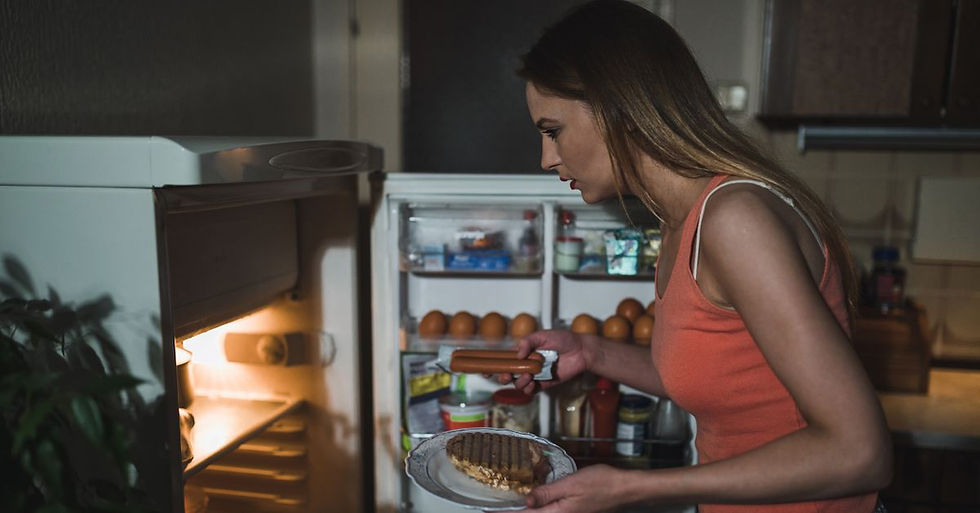How To Combat Late Night Eating For Weight Loss
- Vicki Witt
- Aug 16, 2024
- 3 min read
What you eat is one of the most important ways to control your weight. But when you eat may be equally important. If you eat late at night you are more likely to gain weight and suffer from other health issues.

Late night eating is not just a bad habit that needs to be changed. It can also be an eating disorder known as Night Eating Syndrome or NES. Binge eating disorder is another eating disorder that can contribute to late night eating.
Consequences of late night eating?
Late night eating has several undesirable effects.
Eating late at night causes weight gain. One study found that participants who ate later had lower leptin levels. Leptin is responsible for signaling that you are full. This study also found a slower metabolism and increased fat storage with the late eaters.
Your body produces more insulin at night so this leads to more fat storage when you eat late at night.
You make poor food choices at night. When you’re reaching for a midnight snack, healthy choices are usually not top of mind. It’s probably comfort food like a bag of cookies or a bowl of ice cream that you are reaching for. Often late night eating is not due to hunger, but a form of uncontrolled binge eating.
It interferes with your sleep. When you eat late at night your food has to be digested. This along with eating foods that contain caffeine or sugar can interfere with your sleep.
It can contribute to GERD. When you lie down while you’re still digesting, gastric acid increases which leads to heartburn and abdominal discomfort. Eating high fat foods can make this situation even worse.
Eating late at night increases the risk of type 2 diabetes. Nighttime eating has been shown to lead to insulin resistance which often leads to type 2 diabetes.
Late night eating leads to a higher risk of cancer. Eating late at night also increases the risk of developing cancer.

Why you are eating late at night
There are several reasons you may be eating late at night:
Hormone imbalances.
Depression or anxiety
Poor sleep habits
High stress leading to higher levels of cortisol
Blood sugar fluctuations
Not eating enough during the day
Circadian rhythm disorders

How to stop late night eating
In order to control late night eating it’s important to look at the underlying cause. There are several areas to look at when you try to control late night eating.
If you have an eating disorder like NES or Binge Eating Disorder professional help can help you gain control of your eating patterns.
Practicing stress reduction techniques like yoga or meditation can help to reduce stress and anxiety and night time cortisol levels.
Improve your sleep habits. Getting better sleep means you are less likely to wake up at night and need a snack.
Reduce or eliminate high sugar and highly processed carbohydrates which can cause hormone disruption and blood sugar imbalances
Get physical activity during the day, outside if possible to help re-establish circadian rhythms and to help you get better sleep
Get professional help

How I can help
Late night eating is not something to be taken lightly. I can help you tackle your late night eating with eating plans and lifestyle advice. Together we work through the root cause of your late night eating and develop a plan that will help you get back to a healthy eating schedule.
Warm wishes,

Vicki Witt | Clinical Nutritionist | Holistic Coach | Reiki Master | Certified LEAP allergy therapist Over 25 years of successfully helping you achieve optimal health and weight loss 🍏| www.vickiwittweightloss.com
About Vicki:
Vicki Witt is a Clinical Nutritionist, Holistic Health Coach, and Reiki Master. She has been practicing over 25 years and specializes in holistically customizing diet and lifestyle plans to each individual for weight loss and hormonal control. Her clientele often report they feel the best they have ever felt and wish they had started sooner. One of the USA and Australia's top Nutritionists, she has won multiple awards for her services in the industry.
Certified and Registered Nutritionist
.png)







Comments